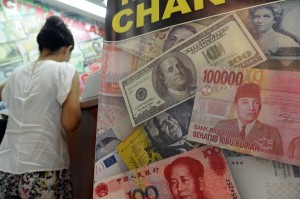
US dollar, Indonesian rupiah and Chinese renminbi currencies are displayed in the poster of a money exchange shop in Jakarta on June 12, 2013. Indonesia’s central bank on June 12 moved to shore up its rupiah currency after it hit a four-year low, as foreign investors exit emerging markets due to expectations that huge stimulus schemes in the developed world will soon end. AFP/ROMEO GACAD
JAKARTA—Indonesia’s central bank has moved to shore up its rupiah currency after it hit a four-year low, as foreign investors exit emerging markets due to expectations that huge stimulus schemes in the developed world will soon end.
Developing economies around the world are starting to see their stock markets and currencies tumble on the belief that the US Federal Reserve will pull the plug on its giant easy money program.
Bank Indonesia said it would raise the rate it pays lenders for overnight deposits, known as the Fasbi, by 25 basis point to 4.25 percent effective Wednesday.
Officials hope to encourage lenders to leave their rupiah with the central bank, thereby reducing money supply and in theory stopping the currency from weakening further.
Following the announcement late Tuesday, the rupiah strengthened slightly. By Wednesday afternoon it was at 9,933 rupiah against the dollar, from 10,094 on Tuesday—its lowest level since 2009.
Analysts said the fall was precipitated by a sell-off in Indonesian bonds and stocks as investors fret about when the US Federal Reserve will begin to taper its massive programme of bond buying, known as quantitative easing.
The huge central bank spending sprees and low rates in the West aimed at kickstarting growth had led investors to emerging markets in search of better returns, sending stocks and currencies soaring.
But a pick-up in the US economy has now made US assets and the dollar look like a better and safer bet.
The Bank of Japan added to investor worries on Tuesday when it decided to hold off any fresh measures to boost its economy after unleashing a giant bond-buying scheme in April.
Jakarta’s stock market plunged 3.5 percent on Tuesday and is down sharply from its record high seen in May. However, it rebounded 1.91 percent on Wednesday after the Fasbi rate was hiked.
The sell-off mirrors similar movements in other developing economies.
India said it had intervened in currency markets Tuesday after the rupee sank to a record low against the dollar owing to fund outflows.
The Thai baht has tumbled to a nine-month low and its stock market is down more than 10 percent from May. Manila’s stock market is 12 percent down from its May peak.
There have also been big losses for shares and currencies in other nations, including South Africa and Mexico.
“It feels like the party is ending,” Howard Wong, managing director at Doric Capital Corp in Hong Kong, told Dow Jones Newswires.
The rupiah, one of Asia’s worst performing currencies in the past year, was already under pressure owing to concern about Indonesia’s widening current account deficit, largely blamed on huge fuel subsidies.
Economists said the timing of the rise in the Fasbi rate showed how worried policymakers were, since such decisions are normally taken at central bank policy meetings.
“The timing of this increase came as a surprise, no doubt reflecting central bank concerns that the currency could spin out of control,” said Robert Prior-Wandesforde, a Singapore-based economist from Credit Suisse.
The next meeting is on Thursday, when policymakers are expected to hold the benchmark interest rate at 5.75 percent for the 15th consecutive month.